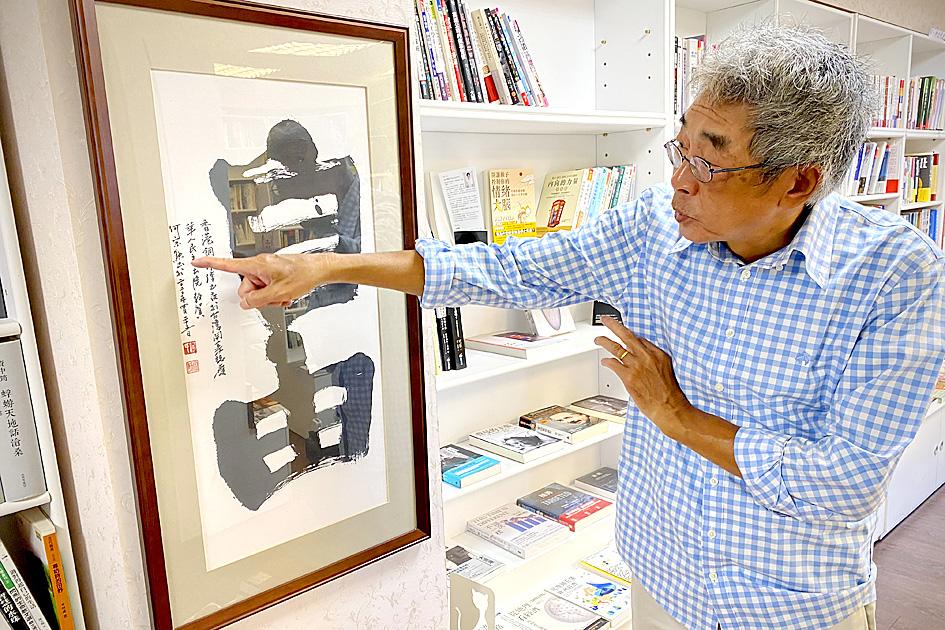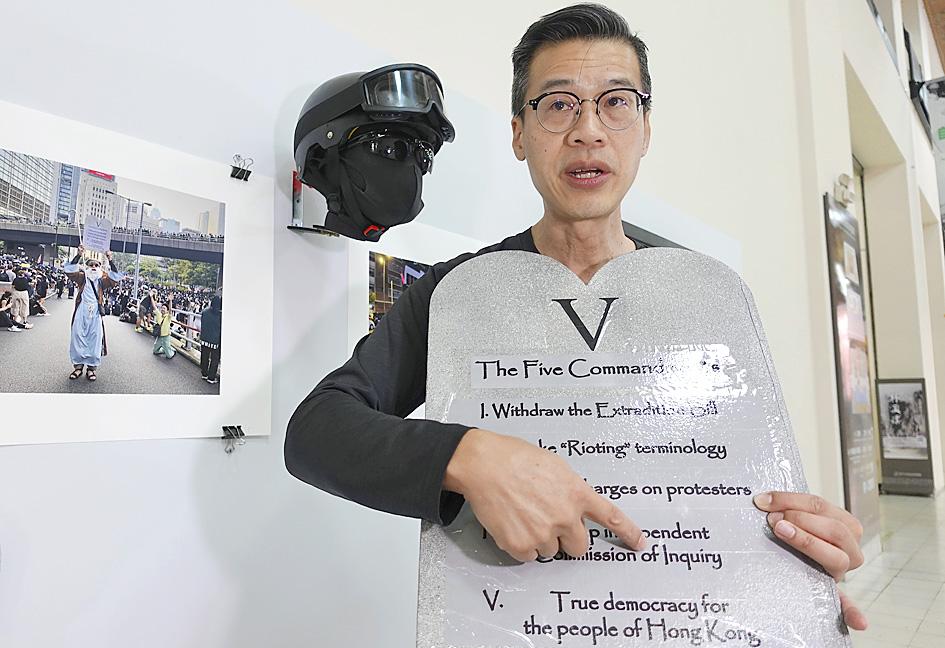For Lam Wing-kei (林榮基), a Hong Kong bookstore owner who was detained by police in China for five months for selling sensitive books about the Chinese Communist Party, coming to Taiwan was a logical step.
A nation just 640km from Hong Kong, Taiwan is close not just geographically, but also linguistically and culturally. It offers the freedoms that many Hong Kongers had grown used to before Britain returned the territory to China.
Lam reopened his bookstore in Taipei. His move in 2019 presaged a wave of emigration from Hong Kong, after tension between the territory’s Western-style liberal values and China’s authoritarian political system culminated in explosive pro-democracy protests that year.

Photo: Johnson Lai, AP
“It’s not that Hong Kong doesn’t have any democracy, it doesn’t even have any freedom,” Lam said in an interview. “When the English were ruling Hong Kong, they didn’t give us true democracy or the power to vote, but the British gave Hong Kongers a very large space to be free.”
Hong Kong and Chinese leaders are this week to mark the 25th anniversary of the territory’s return to China.
In 1997, some people were willing to give China a chance. China had promised to rule the territory under a “one country, two systems” framework for 50 years, meaning that Hong Kong would retain its own legal and political system, including freedom of speech.

Photo: Johnson Lai, AP
However, following the 2019 protests, China imposed a National Security Law that has left rights advocates and others living in fear of arrest for speaking out.
Hong Kong still looks the same. The malls are open and the skyscrapers are gleaming.
However, artist Kacey Wong (黃國才), who moved to Taiwan last year, said that he constantly worried about his own arrest or those of his friends, some of whom are now in jail.
“On the outside it’s still beautiful — the sunset viewed from the harbor — but it’s an illusion that makes you think you’re still free,” he said. “In reality you’re not. The government is watching you and secretly following you.”
Although Wong feels safe in Taiwan, life as an exile is not easy.
Despite its similarities to Hong Kong, Wong has found his new home to be an alien place. He does not speak Hoklo (also known as Taiwanese) and the laid-back nation contrasts strongly with the fast-paced financial capital that was Hong Kong.
The first six months were hard, Wong said, adding that traveling as a tourist to Taiwan is completely different than living on there in self-imposed exile.
“I haven’t established the relationship with the place, with the streets, with the people, with the language, with the shop downstairs,” he said.
Other, less prominent exiles than Wong or Lam have also had to navigate a system that does not have established laws or mechanisms for refugees and asylum seekers, and has not always been welcoming.
That issue is further complicated by Taiwan’s increasing wariness of security risks posed by China and of Beijing’s growing influence in Hong Kong.
For example, some Hong Kongers such as public school teachers and doctors have been denied permanent residency in Taiwan because they worked for the Hong Kong government, said Sky Fung, secretary-general of the Hong Kong Outlanders, a group that advocates for Hong Kongers in Taiwan.
Others struggle with the tighter requirements and slow processing of investment visas.
In the past year or so, some have chosen to leave Taiwan, citing a clearer immigration path in the UK or Canada, despite the bigger gulf in language and culture.
Wong said that Taiwan has missed a golden opportunity to keep talented people from Hong Kong.
“The policies and actions, and what the ... government is doing is not proactive enough and caused uncertainty in these people — that’s why they’re leaving,” he said.
The Mainland Affairs Council (MAC) has defended its record, saying it found that some migrants from Hong Kong hired immigration companies who took illegal methods, such as not carrying through on investments and hiring locals they had promised on paper.
“We in Taiwan also have national security needs,” MAC Deputy Minister Chiu Chui-cheng (邱垂正) said on a TV program last week. “Of course we also want to help Hong Kong. We have always supported Hong Kongers in their support for freedom, democracy and rule of law.”
About 11,000 Hong Kongers last year received residence permits in Taiwan, according to the National Immigration Agency, and 1,600 were able to get permanent residency.
The UK last year granted 97,000 applications to Hong Kong holders of British National Overseas passports in response to China’s crackdown.
However imperfect, Taiwan gives the rights advocates a chance to continue to carry out their work, even if the direct actions of the past are no longer possible.
Lam is one of five Hong Kong booksellers whose seizure by Chinese security agents in 2016 drew global concern.
He often lends his presence to protests against China, most recently attending a June 4 memorial in Taipei to mark the anniversary of the 1989 Tiananmen Square Massacre.
Similar protests in Hong Kong and Macau, until recently the only places in China allowed to commemorate the Tiananmen Square Massacre, are no longer allowed.
“As a Hong Konger, I actually haven’t stopped my resistance. I have always continued to do what I needed to do in Taiwan, and participated in my events. I have not given up fighting,” Lam said.

SHIPS, TRAINS AND AUTOMOBILES: The ministry has announced changes to varied transportation industries taking effect soon, with a number of effects for passengers Beginning next month, the post office is canceling signature upon delivery and written inquiry services for international registered small packets in accordance with the new policy of the Universal Postal Union, the Ministry of Transportation and Communications said yesterday. The new policy does not apply to packets that are to be delivered to China, the ministry said. Senders of international registered small packets would receive a NT$10 rebate on postage if the packets are sent from Jan. 1 to March 31, it added. The ministry said that three other policies are also scheduled to take effect next month. International cruise ship operators

NUMBERS IMBALANCE: More than 4 million Taiwanese have visited China this year, while only about half a million Chinese have visited here Beijing has yet to respond to Taiwan’s requests for negotiation over matters related to the recovery of cross-strait tourism, the Tourism Administration said yesterday. Taiwan’s tourism authority issued the statement after Chinese-language daily the China Times reported yesterday that the government’s policy of banning group tours to China does not stop Taiwanese from visiting the country. As of October, more than 4.2 million had traveled to China this year, exceeding last year. Beijing estimated the number of Taiwanese tourists in China could reach 4.5 million this year. By contrast, only 500,000 Chinese tourists are expected in Taiwan, the report said. The report

Temperatures are forecast to drop steadily as a continental cold air mass moves across Taiwan, with some areas also likely to see heavy rainfall, the Central Weather Administration (CWA) said. From today through early tomorrow, a cold air mass would keep temperatures low across central and northern Taiwan, and the eastern half of Taiwan proper, with isolated brief showers forecast along Keelung’s north coast, Taipei and New Taipei City’s mountainous areas and eastern Taiwan, it said. Lows of 11°C to 15°C are forecast in central and northern Taiwan, Yilan County, and the outlying Kinmen and Lienchiang (Matsu) counties, and 14°C to 17°C

STEERING FAILURE: The first boat of its class is experiencing teething issues as it readies for acceptance by the navy, according to a recent story about rudder failure The Hai Kun (海鯤), the nation’s first locally built submarine, allegedly suffered a total failure of stern hydraulic systems during the second round of sea acceptance trials on June 26, and sailors were forced to manually operate the X-rudder to turn the submarine and return to port, news Web site Mirror Daily reported yesterday. The report said that tugboats following the Hai Kun assisted the submarine in avoiding collisions with other ships due to the X-rudder malfunctioning. At the time of the report, the submarine had completed its trials and was scheduled to begin diving and surfacing tests in shallow areas. The X-rudder,